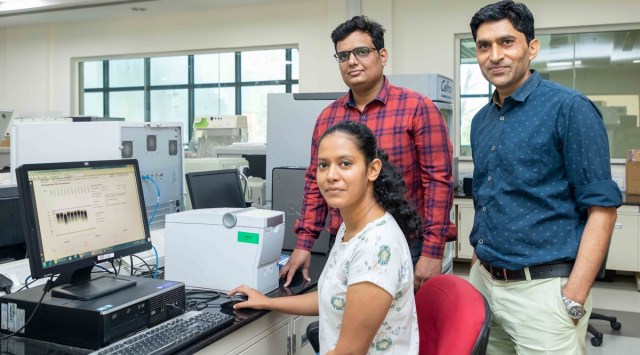Click here to join Express Pune WhatsApp channel and get a curated list of our stories
Study: Novel mutations in malaria parasite sequencing that may lead to drug resistance
According to researchers, there are various factors that together drive drug resistance in infectious agents such as bacteria, viruses, and in this case malarial parasite Plasmodium.
 (L-R) Researchers involved in the study, Deepak Choubey, Bhagyashree Deshmukh and Dr Krishanpal Karmodiya. Courtesy: Science Media Centre, IISER, Pune
(L-R) Researchers involved in the study, Deepak Choubey, Bhagyashree Deshmukh and Dr Krishanpal Karmodiya. Courtesy: Science Media Centre, IISER, Pune Drug resistance to frontline treatments is a major problem in controlling malaria and to understand how parasites develop resistance, it is vital to sequence their entire DNA. In a new study, Pune scientists at the Indian Institute of Science Education and Research have shown that India has its own unique parasite population in Kolkata and emphasise the need for region-specific genomic surveillance for anti-malarial drugs.
Global efforts to monitor the status of drug resistance have led to more than 20,000 Plasmodium genomes being sequenced worldwide. “Unfortunately, India has contributed very little to these efforts, with only five genomes published so far,” Dr Krishanpal Karmodiya, Assistant Professor, Department of Biology, IISER Pune told The Indian Express. Published in the International Journal of Parasitology, the study is the first from the country that reports whole Genome Sequencing (using an Illumina next-generation sequencing technology) of parasites from the Kolkata region and shows that the Indian region has its unique parasite population.
Malaria continues to threaten public health in India with an estimated 79% of cases from South East Asian countries. It is spread by the bite of infected mosquitoes and results in symptoms such as cyclic fever, chills and headache. However, if left untreated, it can quickly progress to a more severe and life-threatening form.
The World Health Organization (WHO) currently recommends the use of Artemisinin combination therapy and it has worked as a gold standard for many years. Lead researchers of the study and others from IISER including Deepak Choubey and Bhagyashree Deshmukh point out that certain countries in Southeast Asia and Africa, burdened with a high prevalence of malaria, have reported cases of drug-resistant infections.
In 2018, India also reported its first study on the emergence of Artemisinin-resistant parasites in patients from the Kolkata region of West Bengal. “India aims to eliminate malaria by 2030 and hence it is crucial to understand the mechanisms behind parasite resistance to drugs,” according to Dr Karmodiya.
According to researchers, there are various factors that together drive drug resistance in infectious agents such as bacteria, viruses, and in this case malarial parasite Plasmodium. “The very common reason is mutations or slight changes in the composition of DNA (the genetic material in the cells) that allow the pathogens to avoid the effects of the drugs or lie dormant until the drugs are gone,” the scientist added.
Click here to join Express Pune WhatsApp channel and get a curated list of our stories








